Expecting his second daughter at any moment, Omar Harris (@omartheplumber) knew he wanted to do something so he could provide for his family. The goal was to find a career that was an absolute necessity so job security would always be there. “I remember discussing what I wanted to do with my fiancé, Xylina. She Read more
Featured Articles
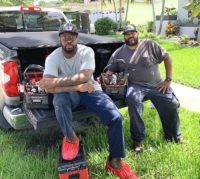
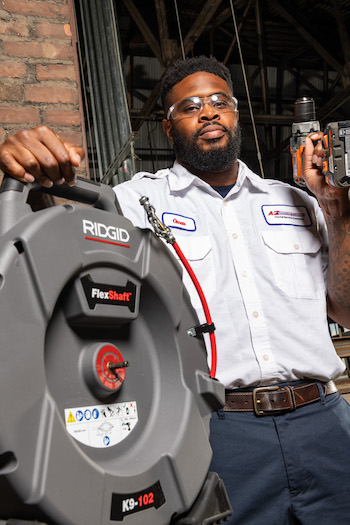 Expecting his second daughter at any moment, Omar Harris (@omartheplumber) knew he wanted to do something so he could provide for his family. The goal was to find a career that was an absolute necessity so job security would always be there. “I remember discussing what I wanted to do with my fiancé, Xylina. She told me ‘whatever it is that you want to do I support you 100%, as long as you’re happy. Even if that means selling flowers on street.’ It would change the dynamic in our household greatly,” says Harris. Xylina repeatedly told him this before he eventually made the final leap.
Expecting his second daughter at any moment, Omar Harris (@omartheplumber) knew he wanted to do something so he could provide for his family. The goal was to find a career that was an absolute necessity so job security would always be there. “I remember discussing what I wanted to do with my fiancé, Xylina. She told me ‘whatever it is that you want to do I support you 100%, as long as you’re happy. Even if that means selling flowers on street.’ It would change the dynamic in our household greatly,” says Harris. Xylina repeatedly told him this before he eventually made the final leap.
“My fiancé plays a major role. Without her, the whole family dynamic would fall apart. I am fortunate. She’s a great mom, a great friend, and she really keeps everything in the family running. She’s extremely patient and understanding when I’m dead tired. I will forever be grateful for the sacrifices she has made and for the unconditional support she has shown me,” says Harris.
But Harris would be remiss if he didn’t mention his parents. They worked hard for what they have and “they instilled in me the drive needed to be the best at what I do. Growing up, they always told me learn a trade because you can demand your own salary,” says Harris.
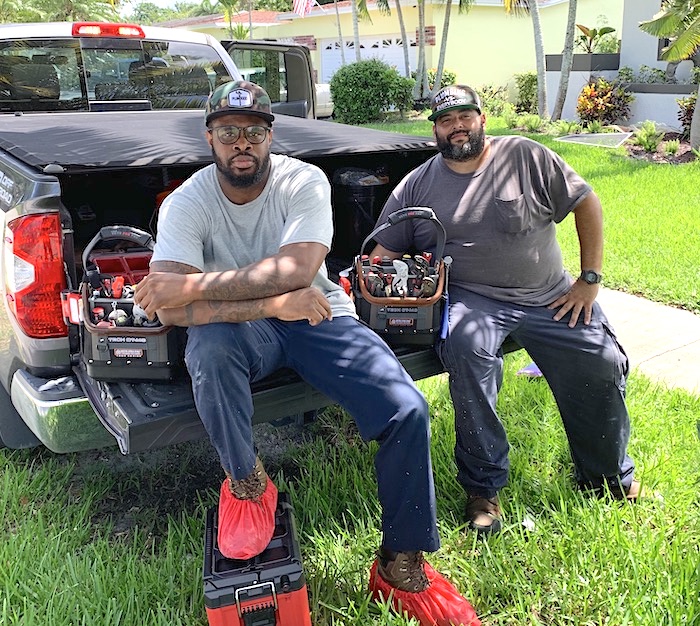
Harris with Conrad Ensenat (Broward County Facilities)
Harris initially started out as an apprentice with a local union doing construction plumbing. He eventually left to go a private company that mainly did service and drain cleaning. “I learned a lot with that company and made some really good partnerships/friendships. It allowed me to grow, not only as a man, but as a plumber, too,” says Harris.
For the past two years, Harris has worked as a plumber for Broward County Facilities (Florida) as a plumber specializing in drain cleaning. Some may not know, but Harris is a certified HVAC technician and Certified Fire Inspector for the state of Florida. One of the most rewarding aspects of the job for Harris is seeing the customer’s smile after the work is done, correctly. (Some of Harris’s go-to tools are RIDGID RP241 press tool, RIDGID E110 wrench, Fluke T5 600 Voltage, Continuity and Current Tester and the Milwaukee Tool M12 PEX Expansion Tool Kit.)
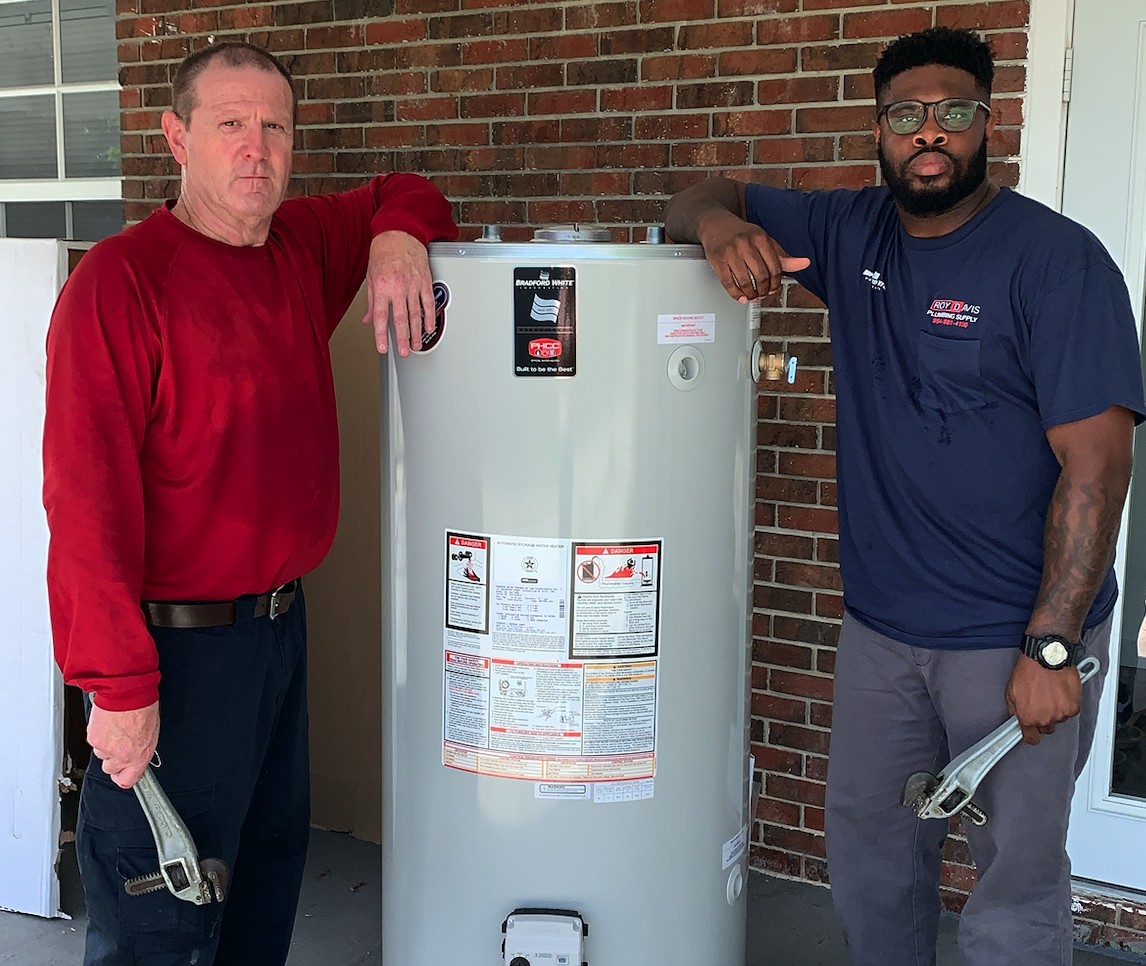
Harris with Roger Bircheat, Master Plumber, Broward County Facilities, who has been in the trade for more than 30 years.
As far as learning the trades, Harris is always learning. “I love to learn from others so that I can be the best plumber I can be,” says Harris. One of Harris’s mentors and a person he looks up to is Hiram Martinez, master plumber, A to Z Statewide Plumbing, West Park, Fla., who taught Harris a lot, and was very patient with him. Another influence includes Conrad Ensenat, a residential plumber. “He’s a great friend, but he also taught me a lot.”
John Driscoll Jr., owner, A to Z Statewide Plumbing, took Harris under his wing and really showed him the ropes in drain cleaning. “He always drilled into my head to never skip steps and to take my time following the steps. He really helped me with laying the foundation of my plumbing skills,” says Harris.
Harris also recognizes John Thompson, a great person with whom to speak. From his family values to how he runs his business, Thompson has garnered a tremendous amount of respect from Harris. George DeJesus has also been instrumental in showing Harris a lot of “tricks of the trade.”
And Eric Aune. “I learned a lot from watching him on YouTube; he’s a great teacher.”
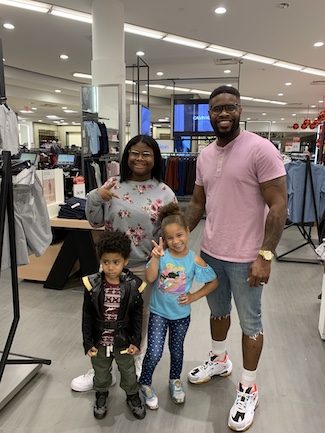
Harris spending some family time shopping with his kids.
But does Harris consider himself a mentor to others? “Honestly, yes I do consider myself a role model. I feel like if I can make it, anyone can. I’ve had a lot of hardships in my life and I’ve been able to overcome them. Many didn’t believe in me but I was fortunate enough to have a few who did. I’m willing to help anyone who would like to learn,” says Harris.
How can the industry promote the trades? Acceptance and training, says Harris. “We need to have plumbers from all walks of life from all over the world. In addition, we don’t need to be so hard on someone trying to learn. At times, I’ve seen this industry a little too hard on some individuals. It can be a little intimidating for someone just starting out. Instead, we need take the opportunity to coach, teach and possibly train the individual so that in the future they can be a better plumber.”
Social media has opened many great opportunities for Harris. “It has allowed me to participate in my friends’ lives who live in other states. On Instagram, we have group chats just to check in or ask questions. Social media is a great platform to build connections with people from all over the world. It is a useful tool to learn from and utilize to keep up with the ever-growing industry,” says Harris.
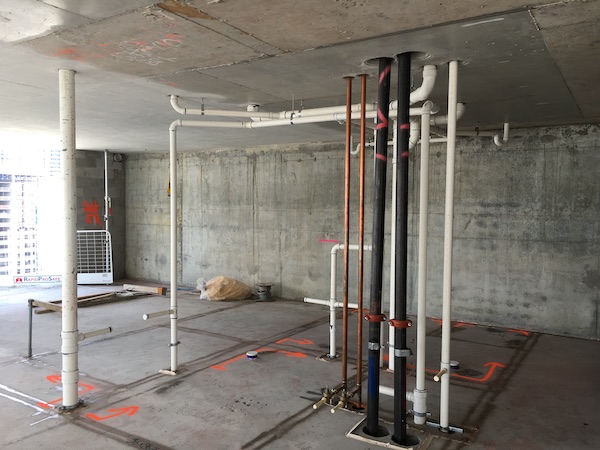
Just another day at the office.
Speaking of social media, Harris recently was chosen to attend a past RIDGID Experience. “The RIDGID Experience was a phenomenal time!” says Harris. “I met some great people who now I consider great friends. I gained a lot of knowledge and have a pool of great minds to pull from when I need help with something. I am very grateful and honored I was chosen for the RIDGID Experience. RIDGID is a great company and it’s awesome that they host that event. How many other companies are doing this?”
The last time Harris said “today is a great day,” he was removing a mainline stoppage and there was a clean out right in front of the house, holding sewage. “I removed the stoppage in three feet, and I actually yelled out on the top of my lungs, ‘TODAY WAS A GREAT DAY!’”
In the end, Harris spends whatever free time he has working out and spending time with his family. And, most of all, trying his best to spend time with his kids, to be there for all of their accomplishments, and incorporate his family into what he does. “I try to be the best version of me for my kids. My family has been my backbone in this journey and I hope to instill that same drive I have in me, in my kids.”
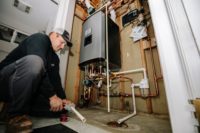
As you read this, thousands of American families are considering a move to less densely populated areas. Towns and cities within the Rocky Mountain States – Idaho, Montana and Wyoming specifically – are seeing unprecedented population growth. The idea of living in rural and suburban areas is gaining a lot of interest among residents of Read more
As you read this, thousands of American families are considering a move to less densely populated areas.
Towns and cities within the Rocky Mountain States – Idaho, Montana and Wyoming specifically – are seeing unprecedented population growth. The idea of living in rural and suburban areas is gaining a lot of interest among residents of the country’s more populated regions.
Popular opinion in these scenic areas attribute the migration to three major factors: social unrest in urban areas, prevalence of COVID-19 cases, and the ability for more people to telecommute, professionally.
The owner of a moving company in Cody, WY, noted that they had relocated a dozen families from California in May alone. Real estate prices are rising, counter to what would be expected during a recession. Similar stories come from Montana.
“A customer of mine who is a real estate agent just sold a $700,000 home sight unseen to a family from back East,” said Andy Mickelson, owner of Mickelson Plumbing and Heating Inc. in Missoula, MT. “He took them through the home via Skype just before a contract was signed. Migration is extreme. Houses are selling fast, and high.”
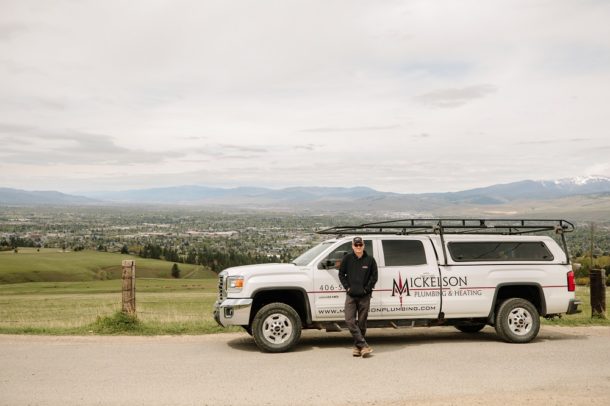
Earlier this year, the same real estate agent referred a recent homebuyer to Mickelson for boiler replacement. Not surprisingly, the house was purchased in a hurry.
“The homeowner ran out of domestic hot water a week after buying the home, so we replaced the igniter on the mod-con boiler which was supplying heat to an indirect tank,” said Mickelson. “We also found that the heat exchanger had failed, so we returned to replace the boiler as soon as we could.”
Mickelson is a Montana native who started his own company in 2011, after 13 years at a large mechanical firm. Today he employs two full time technicians and has the work for more – if only he could find the right people. He’s a self-proclaimed wet-head, but his skill set also includes commercial controls, plumbing and air conditioning.
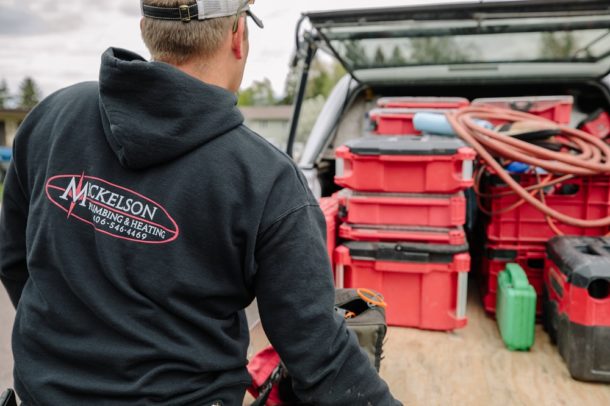
While Mickelson’s work can be seen in commercial buildings and full-blown mountainside mansions (he’s done work for some of the world’s most famous musicians), this specific home was average in every way.
Smart components
The 2,500-square-foot bi-level was constructed in the 80s, and the aluminum-block condensing boiler he found in the house was, to his knowledge, boiler number two. Installing boiler number three, a 199 MBH Aspen Combi made by U.S. Boiler Company, would have been pretty straightforward if not for several messy system changes that had been done in the past.
“The system was a result of 30 years of additions and haphazard corrections,” explained Mickelson. “At one point a water softener had been added, and an irrigation system was tee’d into the domestic piping. On top of that, the first retrofit was a hack job.”
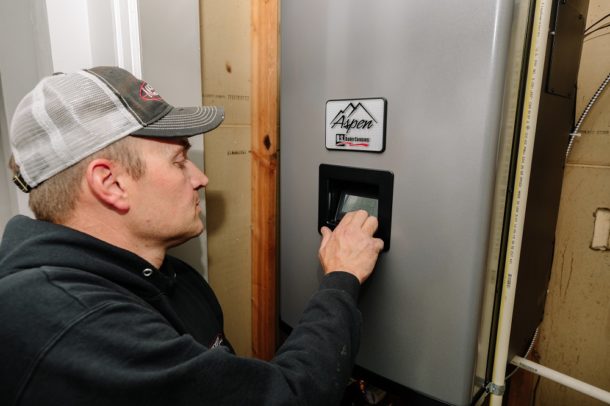
At least the three zones of fin-tube baseboard were in good condition; one downstairs and two upstairs. By the time he started to cut the supply and return piping out of the closet mechanical room, he already had a plan for the new system.
“I pair a heat load calculation with a radiation measurement,” said Mickelson. “This not only tells me the supply water temperatures I’ll need for proper outdoor reset programming, but it gives me the flow and head I’ll need out of my system pump. This is valuable information to optimize comfort and efficiency with two components I used on this job.”
“A Taco 0018e circulator allows me to precisely set my flow rate for a 20°F Delta-T, and paired with U.S. Boiler’s Sage Zone Control, the pump will respond perfectly as zones open and close.”
Without the help of a buffer tank, the Sage Zone Control allows the boiler to start at low fire and only increase to the firing rate needed for the zone (or zones) calling. Mickelson inputs the size of all three zones, and the boiler fires accordingly, never exceeding the actual load, and the ECM circulator responds by modulating the flow rate across the system.
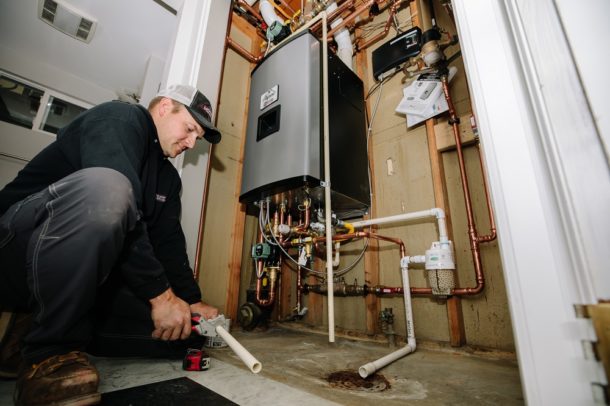
“A single circulator with baseboard and zone valves is perfect for this setup,” said Mickelson. There’s never a concern about being over- or under-pumped. This house needs about five feet of head and five GPM with all zones open.”
“Both the Sage Zone Control and the 0018e are very easy to program,” he explains. “The panel is accessible through the boiler’s Sage Control, which is connected to the boiler via a CAT 5 cable. I access the pump via a Bluetooth app on my phone. It has a number of different modes; constant speed, proportional pressure, and constant pressure, as well as a self-adjusting proportional pressure mode.”
The perfect fit
For simplicity and space savings, Mickelson installed the Aspen Combi instead of adding an indirect tank. The house only has two occupants, so there’s never a concern of running more than two showers at a time.
Connections to the combi boiler were very easy to make from the bottom side of the unit, even in the cramped closet. Adjusting the burner for Missoula’s 3,200 foot elevation was simple. The factory-supplied exhaust fitting has a built-in test port for a combustion analyzer, and the boiler cabinet has a side access panel for easy access to the gas valve.
“Taco’s mobile app for Bluetooth connection to the circulator makes changing modes, etc., very easy, and all feedback from the Aspen boiler and the Sage Zone Panel read out in plain English on the boiler’s touchscreen display,” said Mickelson. “I didn’t need a secret decoder ring to set the unit up.”
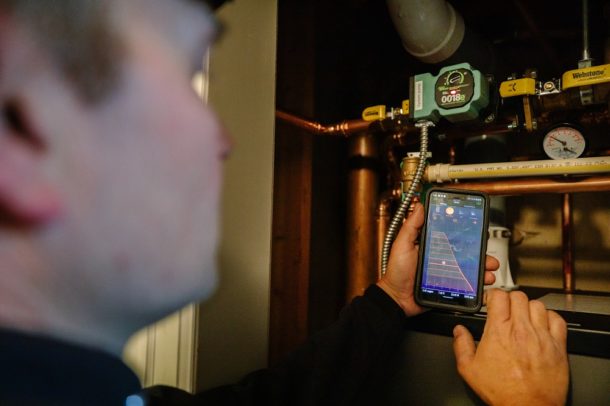
The homeowner’s frustration at buying a property that immediately needed a new boiler came at least with a silver lining. The new system is comfortable and reliable. Ignition is smooth, and the loudest noise that the system makes is the baseboard heating up. That’s a very good thing, considering that the mechanical closet is adjacent to the owner’s home office.
As working from home in the Rocky Mountains becomes more popular, the mechanical contractors who’re best suited to provide the right solutions will benefit while western towns grow.
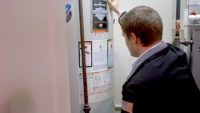
Recently, Mechanical Hub spoke with Dustin Bowerman, Director – Corporate Training and Product Support, Bradford White, regarding information surrounding gas vs. electric water heaters. The following is an exclusive Q&A. Which type of water heater is more environmentally friendly? Why? Bowerman: Although gas heaters have an exhaust element that most will immediately say is less Read more
Recently, Mechanical Hub spoke with Dustin Bowerman, Director – Corporate Training and Product Support, Bradford White, regarding information surrounding gas vs. electric water heaters. The following is an exclusive Q&A.
Which type of water heater is more environmentally friendly? Why?
Bowerman: Although gas heaters have an exhaust element that most will immediately say is less environmentally friendly, you have to consider the carbon footprint of how the electricity is generated, too. Unless coming from a renewable source, there is an inherent environmental effect with both of these fuel sources.
What is the difference in cost between the two types?
Bowerman: It’s mostly about supply and demand, although there is a regulatory element. As a rule, residential electric water heaters have fewer components, therefore are less costly to manufacture; however, in some locations, regulations or codes are driving towards the use of heat pump water heaters (HPWHs).
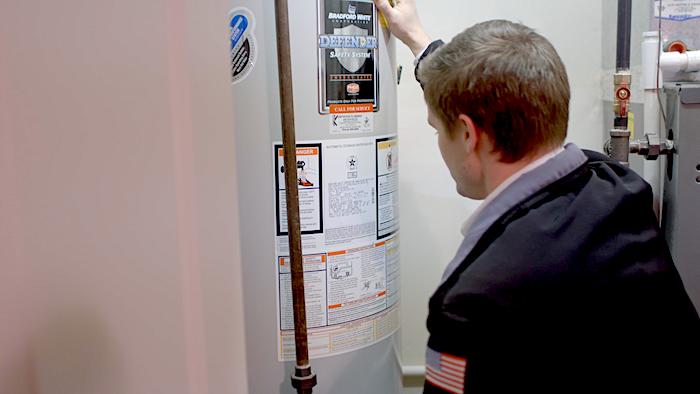
Is there a noticeable difference in return on investment for each type?
Bowerman: Both categories offer high efficiency options, as well as specialty products such as tankless or heat pump water heaters, that can reduce utility spend while delivering the same amount or more hot water than previous models. Though, these higher efficiency options typically come with higher maintenance costs.
Normally, a homeowner will request a replacement of what was already there. How difficult is it to change to a specific water heater source (gas or electric) if the home is equipped with only on type of energy source? (If home has only electric source for WH, what goes into gas conversion and vice versa)
Bowerman: Upgrading utilities can be fairly involved and will certainly require a professional’s experience. If converting from gas to electric, not only will a plumber be needed, but the job will require an electrician, to upgrade the electrical panel and run an outlet for an electric water heater. Converting from electric to gas may require adding gas piping to the home or updating the system to handle the additional demand. An all-electric home likely doesn’t have a chimney system, making gas water heater options more limited. Direct vent, power vent or power direct gas model would need to be utilized. Natural gas availability is also sometimes limited, so propane options may have to be considered if a home or business owner wants to stop using an electric product.
Overall, which is easier to install?
Bowerman: Water connections are the same on both gas and electric. Gas water heaters will have both a gas connection and an exhaust connection that must be done to complete the installation. An electric water heater has line voltage connections with, as a rule, three connections total. Both should be safely installed to comply with all local code requirements by a professional.
Does brand matter more than water heater type?
Bowerman: The type of application is always important, just like having the right tool for the job. Both types of water heaters have their strengths. Of course, brand does matter. Not every water heater is manufactured to the same level of quality nor does every company provide the same level of support and customer service.
There is a lot of talk about legionella and water-borne pathogens lately. Is there one type that is more beneficial in terms of this?
Bowerman: No. Energy source does not impact the quality of the cold-water supply being delivered to the water heater.
What is the ratio of homeowners across the country using one type over the other?
Bowerman: Generally, the entire water heater market is close to a 50/50 split on gas versus electric.
For electric, what happens during a power outage?
Bowerman: The electric water heater requires electricity to heat water. If power is lost, the tank will not reheat the stored water until the power is restored. The already heated water in the tank will remain usable until depleted or gradually cool down.
Does tankless (electric vs. gas) add another layer or dimension to this conversation? Explain.
Bowerman: Yes. Conversations about tankless water heaters are common; however, in many situations the electric options are not as often considered for whole home applications. Electrical requirements may be unrealistic for many homes while gas technologies have made great advancements making tankless gas viable, using natural gas or propane, in the right installations and climates.
Is the footprint between the two (gas vs. electric) noticeable in terms of space?
Bowerman: In terms of the actual products, like gallon capacities are commonly similar diameters, using comparable footprints. Overall, space variations will be more about the gas product’s “add-ons” (e.g. blower, draft hood) due to venting requirements.
In terms of longevity, which type is more reliable?
Bowerman: National averages for functional lifespan tend to be a couple years longer on electric water heaters.
Can you talk in terms of efficiency for both types?
Bowerman: Both energy sources offer high efficiency models. If looking at base models, electric water heaters employ immersion heating elements. As these are directly submersed into the water, most of the elements’ heat energy is being absorbed into the surrounding water. Gas water heaters employ a combustion chamber that traditionally is located below the water tank. Heat is transferred through the bottom of the tank in addition to the flue(s) that is surrounded by the stored water.
This isn’t the whole story. Annual operating cost is another measurement than can be used to compare models. While these costs are largely influenced by the local utility pricing, gas models usually show less annual operating costs. Water heaters are rated based upon how much hot water they can deliver (i.e. First Hour Rating). Depending on their First Hour Rating, models will fall into one of four draw bins. A model must only be compared to other models in the same draw bin, as this will impact the operating cost.
Could the decision gas vs. electric come down to how much water will be needed to heat? (How many people in the home and for what functions)
Bowerman: Infrastructure, what fuel source is available, and hot water demand are the largest variables in water heater selection and contractors need to understand these prior to making suggestions and doing installations.
Are electric water heaters safer?
Bowerman: Having your water heater installed and serviced by a qualified professional is the best way to make sure that your gas or electric fueled water heater is performing properly and safely.
Finally, why is the question of gas vs. electric so polarizing?
Bowerman: It’s due to a lack of understanding. For many contractors in the plumbing trade, electricity is not a part of their daily work, making it mysterious. For consumers, it’s similar. They are generally more comfortable with what they use on a daily basis and has historically worked for them.
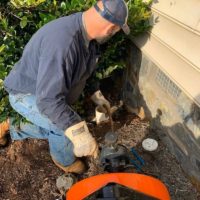
So, as the story goes, a sales rep out west who had spent decades selling a competitor’s plumbing products is hired by General Pipe Cleaners. After initial training, he returned to his territory with a smattering of cables, cutters and drain cleaning machines to get him started. The first time he demonstrated the Flexicore Cable Read more
So, as the story goes, a sales rep out west who had spent decades selling a competitor’s plumbing products is hired by General Pipe Cleaners. After initial training, he returned to his territory with a smattering of cables, cutters and drain cleaning machines to get him started.
The first time he demonstrated the Flexicore Cable, he called the company to complain that the pipe snake, “just didn’t feel right!” It felt “limp”, not “springy.”
As Dave Dunbar, National Sales Manager with General Pipe Cleaners explained, “the Flexicore engineering process has the effect of making the cable feel less springy than hollow cables.”
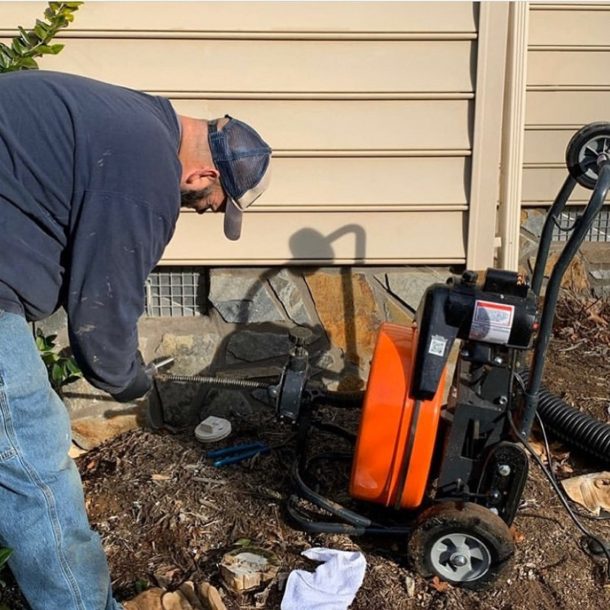 It took a few phone calls to get things straightened out with the rep, but then six months later, he was complaining that the cables lasted so much longer than his former brand’s that he was only selling a fraction of his previous replacement snakes. A small fraction.
It took a few phone calls to get things straightened out with the rep, but then six months later, he was complaining that the cables lasted so much longer than his former brand’s that he was only selling a fraction of his previous replacement snakes. A small fraction.
It was this story that interested a few of our contractor friends. Why would it be springy? Is it really that stiff and is that a good thing? Would it really last longer?
Knowing General Pipe Cleaners would be at the WWETT Show this past spring, I introduced the General’s team to a few drain cleaning contractors that we are big fans of and have worked with in the past. It was my hope that we could create some valuable and interesting content based on the original story and the contractors having never used Flexicore.
It was soon after the show that we asked for them to send a few of their Flexicore cables to a few of our ProStaff team members to get their thoughts on the cable. They obliged and three drain cleaning pros were sent the cables to use on their existing cable machines, which for transparency, were all competitor drum machines.
As you may know, the Flexicore cable is the result of a process, where instead of coiling a hollow cable, they tightly wrap spring steel around a 49 strand aircraft quality wire rope. This provides the cable additional strength when it is under torque.
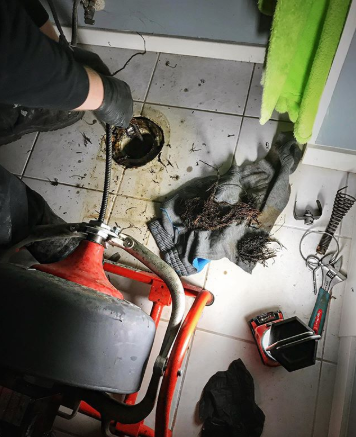 Each member of our team received a variety of Flexicore cables based on their typical daily drain cleaning challenges with the request to use them over a couple of months and provide feedback. The team of contractors included Felix Delgadillo, DrainGuys (Chicago), Terence Chan, Impetus Plumbing (Vancouver) and Jeff Keller, Bulldog Contractors (Texas), all are longtime drain cleaning professionals in their area of the country.
Each member of our team received a variety of Flexicore cables based on their typical daily drain cleaning challenges with the request to use them over a couple of months and provide feedback. The team of contractors included Felix Delgadillo, DrainGuys (Chicago), Terence Chan, Impetus Plumbing (Vancouver) and Jeff Keller, Bulldog Contractors (Texas), all are longtime drain cleaning professionals in their area of the country.
As expected, those daily challenges included providing both residential and commercial services, addressing clogged kitchen drains, clogged bathroom drains, clogged outdoor drains, and clogged sewer lines using today’s best technology to unclog lines to keep the water flowing.
While Keller, Chan and Delgadillo confirmed that this was the first time using the cable, Chan stated what all three mentioned, “I’ve never used the product but very excited to see what it can do.”
Chan went on to say, “Initially seeing the product, I was a bit leery how it may hold on to the heads, but it did, really well. In fact, I’ve had trouble with heads from a competitor and the Flexicore held.”
“The screws to hold on the head versus a snap lock is a nice addition,” said Keller.
One of the unique byproducts of the Flexicore process is that the cable stiffens and gets stronger under torque, which Delgadillo agreed, “the cable feels less springy and it does get quite stiff when the operator needs it the most.”
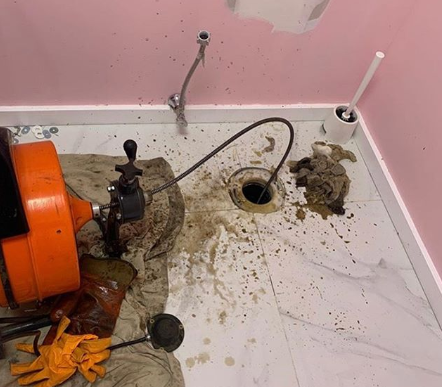 Keller continued, “it caught me off guard and took some getting used to. Most if not all drain cleaners/plumbers are used to listening to their machines and the feel of the strain on the cable to evaluate the blockage, so this was a bit different, but did a solid job.”
Keller continued, “it caught me off guard and took some getting used to. Most if not all drain cleaners/plumbers are used to listening to their machines and the feel of the strain on the cable to evaluate the blockage, so this was a bit different, but did a solid job.”
As discussed in the WWETT video, when a drain cleaning machine rotates a pipe snake down the drain and it hits a clog or stoppage, tension or torque builds up in the cable. Because of the direction the drum is turning, the reaction of the outer coil of spring steel is that it wants to contract due to the tension. However, because the wire rope is in the way, the only thing that it can do is tighten, which makes it stiffer and stronger and the cable much less likely to kink or break when in use.
Chan concluded, “I would recommend this to peers in the field as it got the job done. I’m curious to see the long-term difference versus some of the cables we typically use and recommend everyone make sure they have the cable sizes they need for their machines.”
We second that Terence! Be sure to size your cables correctly so it all works perfectly.
While the contractors are still using the cables in the field, it was a unanimous decision that more time in the field was needed to truly understand the value of Flexicore cables and how it holds up long term versus other options.
We will continue to check in with the team to provide updates later in the year.
Contractor Bios:
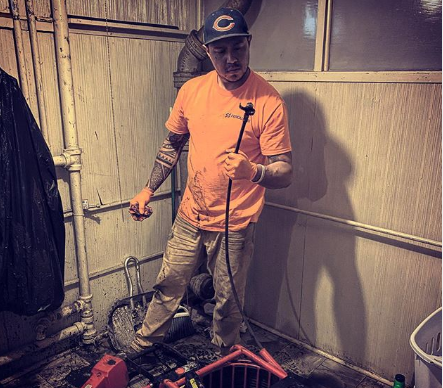 Felix Delgadillo – He has been in the plumbing trades for over 15 years. Most of his experience has been in remodels & new construction for both commercial and residential. He is passionate about new construction and wanted to expand professionally to the service side. In 2019 he started his second company, Drain Guys, LLC. Drain Guys specializes in commercial and residential sewer cleaning, camera inspections & locating.
Felix Delgadillo – He has been in the plumbing trades for over 15 years. Most of his experience has been in remodels & new construction for both commercial and residential. He is passionate about new construction and wanted to expand professionally to the service side. In 2019 he started his second company, Drain Guys, LLC. Drain Guys specializes in commercial and residential sewer cleaning, camera inspections & locating.
IG: www.instagram.com/drainguyschicago
Facebook: www.facebook.com/Drainguyschicago
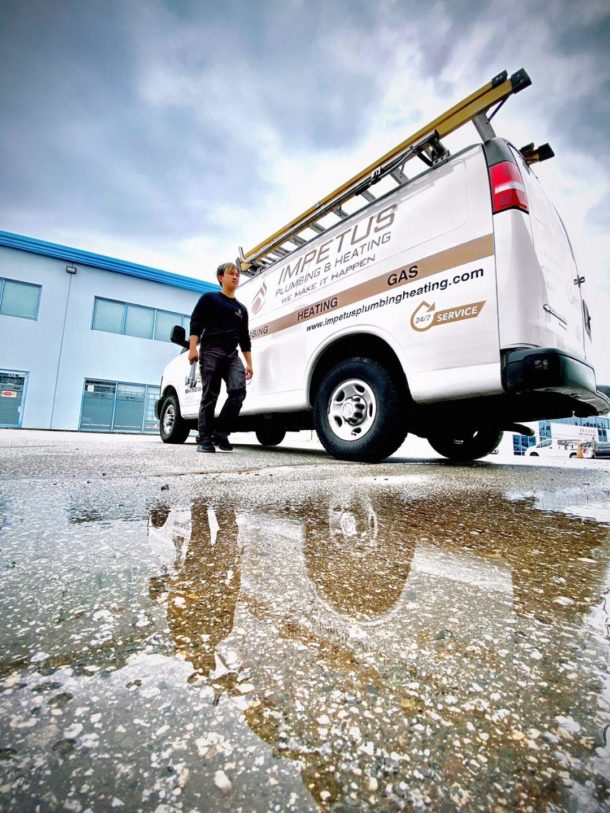 Terence Chan – He is a plumbing, heating and gas contractor out of Vancouver, BC, Canada. His company is Impetus Plumbing and Heating. Impetus stands for a force that makes something happen, which stands for everything their name defines them to be. We make everything happen and will never say no to any job. This company wants to be seen as the next up and coming generation that will make a difference and disturb the status quo in the current trade.
Terence Chan – He is a plumbing, heating and gas contractor out of Vancouver, BC, Canada. His company is Impetus Plumbing and Heating. Impetus stands for a force that makes something happen, which stands for everything their name defines them to be. We make everything happen and will never say no to any job. This company wants to be seen as the next up and coming generation that will make a difference and disturb the status quo in the current trade.
IG: www.instagram.com/impetuspandh
Facebook: www.facebook.com/impetuspandh
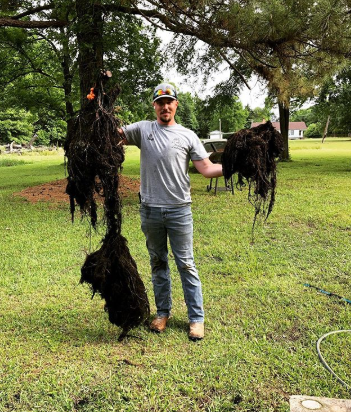 Jeff Keller – Bulldog Contractors allows him to work alongside his father Carl and other Bulldog team members. For over 35 years, Bulldog Contractors have brought areas of Northeast Texas first class plumbing and septic service, experience, and quality work with exceptional results. They are committed to exceed the expectations of our customers with quality service and expertise on every project we do. With a lot of repeat business, they have built long-term & trusting relationships over the years.
Jeff Keller – Bulldog Contractors allows him to work alongside his father Carl and other Bulldog team members. For over 35 years, Bulldog Contractors have brought areas of Northeast Texas first class plumbing and septic service, experience, and quality work with exceptional results. They are committed to exceed the expectations of our customers with quality service and expertise on every project we do. With a lot of repeat business, they have built long-term & trusting relationships over the years.
IG: www.instagram.com/jkeller1.0
Facebook: www.facebook.com/builditlikebulldog
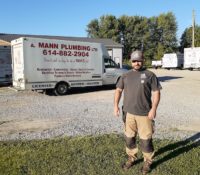
A new life. Nicholas Verkhoturtsev’s story starts in his hometown of Ural—everybody calls it Siberia—Russia. In 2002, Nicholas graduated from Law State University with a Bachelor’s degree. That same year, a company Nicholas worked for as a lawyer, purchased a plumbing company and Nicholas became co-owner of that company. Teaching law at the University and Read more
A new life.
Nicholas Verkhoturtsev’s story starts in his hometown of Ural—everybody calls it Siberia—Russia. In 2002, Nicholas graduated from Law State University with a Bachelor’s degree. That same year, a company Nicholas worked for as a lawyer, purchased a plumbing company and Nicholas became co-owner of that company.
Teaching law at the University and working on his Master’s degree seemed to be the career path he set for himself. “I didn’t do anything in that plumbing company; I just controlled its finances, but I paid attention and learned their work, skills and knowledge,” says Nicholas.
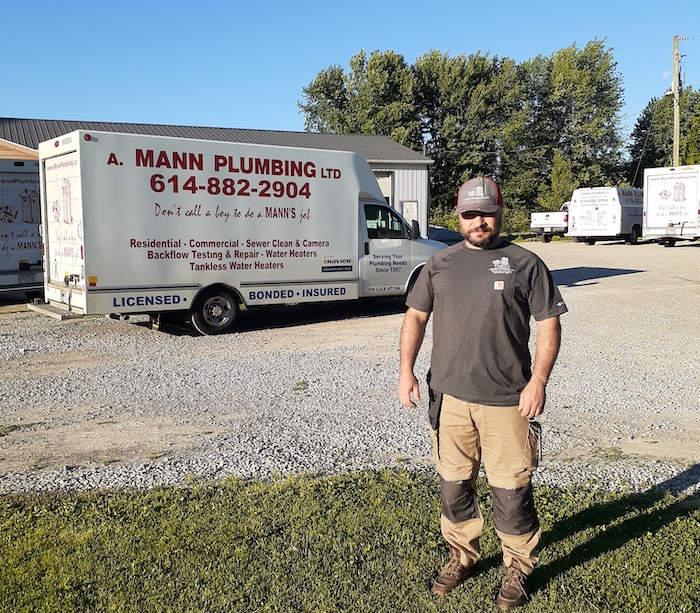
In the meantime, with increasing corruption in Russia, Nicholas became disenchanted and bored with law so he turned to plumbing. “I got interested in plumbing because I liked it as a field where everything depended on my skills and knowledge, not on other people—judges, prosecutors, government people etc.—or how much money I bring them under the table. Yes, I would make more money if I stayed in law, but I fell in love with plumbing because of that independence,” says Nicholas.
He created a plumbing company and hired the guys from the company he controlled previously. “I continued to learn their plumbing skills and did all paper work and management of operations. In 2003-2004, I started to do all work myself and fired the guys who worked for me. Most of my jobs in Russia was residential, but I did some big projects such as a water park—the radiant heating system with mixing and pump units, used 18 miles of PEX pipe—an auto dealership—radiant heating system with climate control, for example,” says Nicholas.
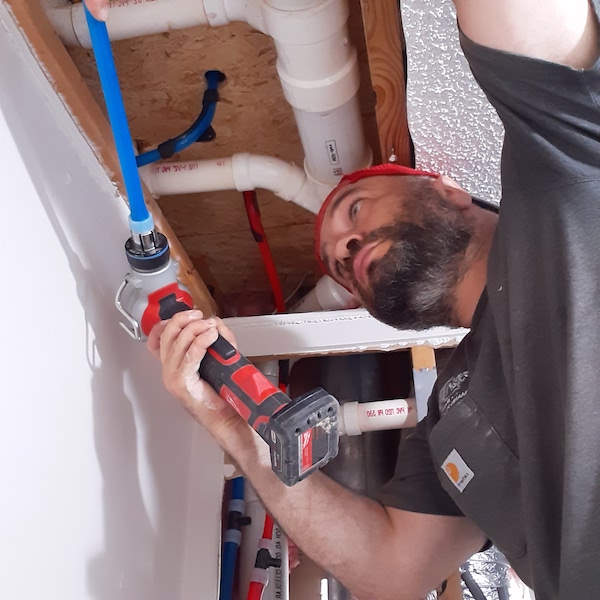 Nicholas soon realized that growing and developing his plumbing business looked grim, and any outlook for making his family’s life better looked increasingly bleak, “because of huge corruption, a sputtering economy and terrible politics by fucking Putin and his people,” says Nicholas.
Nicholas soon realized that growing and developing his plumbing business looked grim, and any outlook for making his family’s life better looked increasingly bleak, “because of huge corruption, a sputtering economy and terrible politics by fucking Putin and his people,” says Nicholas.
What was supposed to be a planned vacation to the United States turned out to be a lifetime commitment. “I tried to change things by becoming a peaceful political protester in my home city, but with very bad results. I ultimately decided to move to the U.S., got all of the necessary documents, and did it.”
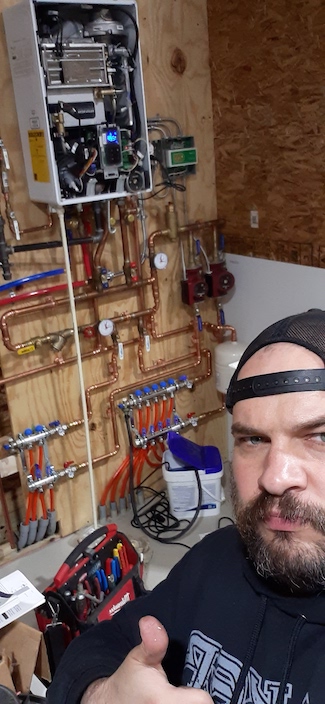 Upon arriving in the United States, Nicholas worked for David Hesson, and for the past five weeks has been working for Robbie Mann at A. Mann Plumbing LTD, Centerburg, Ohio, as a tech for residential and commercial plumbing and hydronic heating systems, service plumbing and drain cleaning. “I am very happy to be a part of their team,” says Nicholas.
Upon arriving in the United States, Nicholas worked for David Hesson, and for the past five weeks has been working for Robbie Mann at A. Mann Plumbing LTD, Centerburg, Ohio, as a tech for residential and commercial plumbing and hydronic heating systems, service plumbing and drain cleaning. “I am very happy to be a part of their team,” says Nicholas.
While growing in the trades and starting his own plumbing business in Russia, Nicholas didn’t have any mentors, really. But, according to Nicholas, “I would call Eric Aune a friend and mentor; I learned a lot from him on Instagram while I worked in Russia.”
Now in the states he’s learned from Hesson, and his current teachers and mentors, Robbie Mann and Mark Starkey. “Every hour, every minute when I work with them I gain knowledge and skills. And, they always answer my stupid questions,” jokes Nicholas.
The Next Generation
Nicholas does express concern about the future of the trades. “I don’t see many young people who are ready to grow and learn things in plumbing, here is the USA and Russia.” And, from what Nicholas has seen is that plumbing in America is always growing. The importance of the trades has never been more evident than in these uncertain times of the pandemic. “After fucking Covid starts, we are getting more service calls. Covid just proves plumbing is as necessary ever,” says Nicholas.
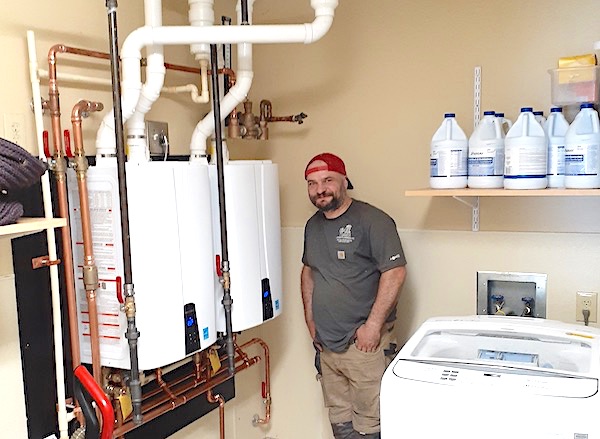 “We all need to reach to people, young people and make them able to realize that plumbing is an essential job, a necessary job, and that people can’t live without water, heating and waste management.”
“We all need to reach to people, young people and make them able to realize that plumbing is an essential job, a necessary job, and that people can’t live without water, heating and waste management.”
Nicholas’s advice to those entering the trades? “Learn everything yourself; learn more than you should know. When you start to work in plumbing, do more than you should do and don’t wait for someone to give you skills and knowledge. Just get all this yourself.”
Me Time, Social Media
In his spare time Nicholas continues to learn plumbing, and he reads American plumbing codes. As well I do some exercises on my knees and back. That is what plumbers need. And, according to Nicholas, balancing family/work life is sharing every concern, every thought, every action about your work with your spouse. Your family should know every detail of your work life. “In my opinion, it helps find necessary time for your family.”
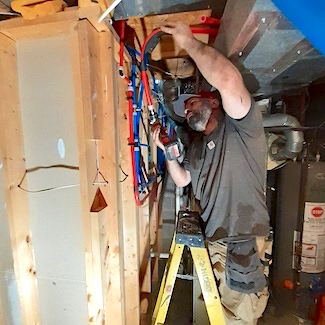 Social media has been instrumental in Nicholas’s growth, as well. He has found many of his current friends in the states on the social media platform. “A couple of my best friends from Instagram are Eric Aune and my boss Robbie Mann. Eric has always supported me, and when I arrived in the U.S., he sent me a bunch of tools which I’m still been using every day,” says Nicholas (@installer.nicholas). “I think Instagram is the best network to share work, knowledge and skills. And sharing these things is a way to find people who understand you totally.”
Social media has been instrumental in Nicholas’s growth, as well. He has found many of his current friends in the states on the social media platform. “A couple of my best friends from Instagram are Eric Aune and my boss Robbie Mann. Eric has always supported me, and when I arrived in the U.S., he sent me a bunch of tools which I’m still been using every day,” says Nicholas (@installer.nicholas). “I think Instagram is the best network to share work, knowledge and skills. And sharing these things is a way to find people who understand you totally.”
The last time Nicholas said, “Today is a great day”? It’s hard to say, says Nicholas. “In plumbing I enjoy results done perfectly; when everything is perfect, especially systems water flow and efficiency. Sometimes I even lose time/money to get something perfect, but I do it to enjoy the result … to enjoy my life, finally.
